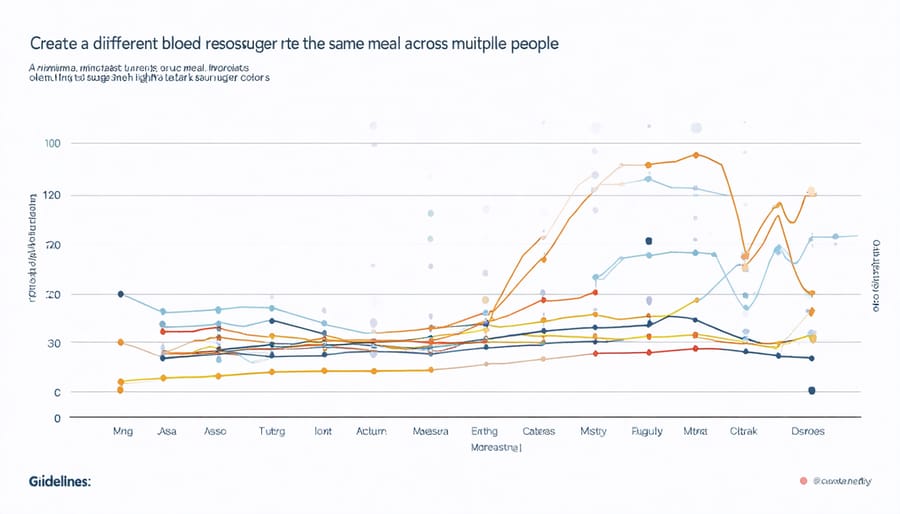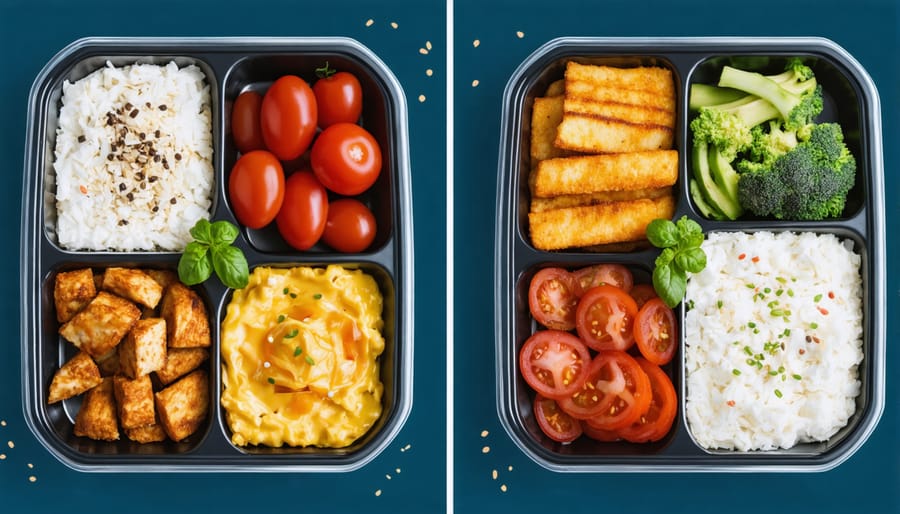Transform your health journey by discovering how your body uniquely responds to different foods. Recent research shows that two people eating the same meal can have dramatically different blood sugar reactions – what works for your friend might not work for you. This groundbreaking approach to nutrition uses advanced technology and data analysis to predict how your blood sugar will respond to specific foods, allowing you to make smarter dietary choices tailored to your metabolism.
Here in Alberta, where diabetes rates continue to rise, understanding your personal glycemic response has never been more crucial. By measuring how different foods affect your blood sugar levels, you can build a personalized eating plan that helps maintain steady energy throughout our busy days, from morning meetings in downtown Calgary to weekend hikes in the Rockies.
This science-backed method moves beyond one-size-fits-all diet advice, empowering you to make informed food choices based on your body’s unique responses. Whether you’re managing diabetes, working to prevent metabolic issues, or simply aiming for better health, personalized nutrition through glycemic response prediction offers a practical path to lasting wellness.
Why Your Body’s Glycemic Response is Unique
The Science Behind Blood Sugar Variations
Have you ever wondered why your friend can enjoy pasta without issue while it sends your blood sugar soaring? The answer lies in our unique biological makeup. Blood sugar regulation varies significantly from person to person, influenced by several factors including gut bacteria, metabolism, and lifestyle habits.
Our bodies each have a distinct microbiome – the collection of beneficial bacteria in our digestive system. These tiny organisms play a crucial role in how we process different foods. Additionally, factors like sleep quality, stress levels, and physical activity affect how efficiently our bodies handle carbohydrates.
Even genetics play a part in this complex puzzle. Your genetic makeup influences enzyme production and hormone levels, which directly impact how your body processes different foods. This is why a one-size-fits-all approach to nutrition often falls short, and why personalized dietary recommendations are becoming increasingly important for optimal health.

Your Metabolic Fingerprint
Your body’s response to different foods is as unique as your fingerprint. While two people might eat the exact same meal, their blood sugar responses can vary dramatically. This individual variation depends on several key factors, including your gut health and metabolism, age, physical activity levels, sleep patterns, and even stress levels.
For example, some people might experience a significant spike in blood sugar after eating a banana, while others maintain steady levels. Your daily routine, including when you eat and exercise, also plays a crucial role. Even factors like the order in which you eat different foods during a meal can impact your body’s response.
Understanding these personal factors is the first step toward developing an eating plan that works specifically for you. It’s not about following a one-size-fits-all diet, but rather learning how your body uniquely responds to different foods and adjusting your choices accordingly.
How Glycemic Response Prediction Works
Modern Tools for Tracking
Today’s technology makes tracking your blood sugar responses easier and more accessible than ever. Continuous Glucose Monitors (CGMs) are small sensors worn on your arm that measure blood sugar levels throughout the day, giving you real-time insights through your smartphone. These devices have become increasingly affordable and user-friendly, making them popular among health-conscious individuals, not just those with diabetes.
Smart apps and digital food diaries help you log meals and track their effects on your blood sugar. Many of these apps can scan barcodes, estimate portion sizes, and even predict glycemic responses based on your personal data. Some popular options include MyFitnessPal and Cronometer, which are widely used by Albertans.
Traditional glucose meters remain reliable tools for spot-checking blood sugar levels. These affordable devices are available at most Alberta pharmacies and require just a small finger prick to provide readings within seconds.
For those interested in deeper insights, local labs offer comprehensive metabolic testing services that can help establish your baseline and track progress over time. Many Alberta healthcare providers now offer virtual consultations to review your tracking data and adjust recommendations accordingly.

From Data to Diet Decisions
Your personalized glycemic data becomes your roadmap to smarter food choices. When you track your body’s responses to different foods, patterns emerge that help you make informed decisions about your diet. For example, you might discover that brown rice causes less of a blood sugar spike than white rice for you personally, or that combining certain foods helps manage your response better.
This information helps you create meal plans that work specifically for your body. You’ll learn which breakfast options keep your energy steady until lunch, and which snacks are best for maintaining stable blood sugar levels throughout your day. The data might show that eating protein with your carbohydrates helps moderate your response, or that spacing your meals differently works better for your metabolism.
Think of it as having a personal nutrition guide based on real evidence from your own body. Instead of following generic diet advice, you can make choices backed by your personal data. This might mean adjusting portion sizes, meal timing, or food combinations to optimize your body’s response. The goal is to use this information to create sustainable, enjoyable eating habits that support your health goals.
Making It Work for You
Starting Your Journey
Beginning your journey with personalized nutrition doesn’t have to be complicated. Start by keeping a simple food diary for one week, noting what you eat and when. Alongside this, if you have a blood glucose monitor, check your levels before meals and two hours after to establish your baseline responses.
Consider investing in a continuous glucose monitor (CGM) if it’s within your budget. Many Alberta pharmacies now offer these devices, and some extended health plans cover the costs. If you’re not ready for a CGM, regular blood glucose testing can still provide valuable insights.
Download a reliable food tracking app to make recording easier. Look for one that includes Canadian food products and measurements. Pay special attention to how different breakfast options affect your energy levels throughout the morning – this meal often has the most significant impact on daily blood sugar patterns.
Start experimenting with food combinations. Try having protein with your carbohydrates, or adding healthy fats to your meals. Notice how these combinations affect how you feel afterward. Keep track of factors like stress, sleep, and physical activity, as these can influence your glycemic response.
Remember, this is about learning what works for your body. There’s no one-size-fits-all approach. If you’re feeling overwhelmed, consider connecting with a registered dietitian in your area who specializes in blood sugar management. Many Alberta health centers offer nutrition counseling services to help you get started.
Fine-Tuning Your Diet
Now that you understand your personal glycemic responses, it’s time to make practical adjustments to your daily food choices. Start by keeping a food diary for two weeks, noting not just what you eat but how you feel afterward. This simple practice can reveal patterns in your body’s responses to different foods.
Consider swapping high-glycemic foods that spike your blood sugar for alternatives that work better for your body. For example, if regular white rice causes significant spikes, try brown rice, quinoa, or barley instead. Remember, these changes don’t have to be all-or-nothing – small adjustments can make a big difference.
Pay attention to meal timing and combinations. Pairing carbohydrates with protein and healthy fats can help moderate your glycemic response. Try adding almonds to your morning oatmeal or having a slice of cheese with your apple.
Listen to your body’s signals. If you notice better energy levels and fewer post-meal slumps with certain food choices, that’s valuable feedback. Many Albertans find that incorporating local, seasonal produce into their meals not only supports local farmers but also provides fresher, more nutritious options.
Start with one meal at a time – perhaps breakfast or your afternoon snack. As you become more comfortable with these changes, gradually expand to other meals. Remember, the goal isn’t perfection but finding a sustainable approach that works for your lifestyle and body.

Real Benefits for Albertans
Success Stories
Meet Sarah from Edmonton, who transformed her health through personalized nutrition. After struggling with unstable blood sugar levels, she worked with a local nutritionist to develop a personalized meal plan based on her glycemic responses. Within three months, she achieved better energy levels and improved her markers for managing metabolic syndrome.
Calgary resident Mike discovered that foods he thought were healthy were actually causing significant blood sugar spikes. Through continuous glucose monitoring and personalized nutrition guidance, he identified his trigger foods and made simple swaps that led to steady energy levels throughout his workday.
The University of Alberta’s Wellness Center reports that participants in their personalized nutrition program showed an average 15% improvement in blood sugar control after six months. Local diabetes educators have noted that clients following personalized nutrition plans are more likely to maintain their healthy eating habits long-term, with 80% reporting better adherence compared to traditional one-size-fits-all diets.
These success stories demonstrate how understanding your unique glycemic responses can lead to sustainable health improvements.
Available Resources
Alberta offers numerous resources to support your personalized nutrition journey. The Alberta Diabetes Institute provides specialized consultations and continuous glucose monitoring services. You can access their expertise through referrals from your family doctor or by contacting them directly.
Local registered dietitians specializing in glycemic response management are available through Alberta Health Services’ nutrition counseling programs. Many offer both in-person and virtual consultations, making it convenient to get professional guidance from anywhere in the province.
Several medical clinics in major cities like Edmonton and Calgary now offer comprehensive metabolic testing and personalized nutrition planning. The University of Alberta’s Metabolic Research Center also conducts ongoing studies and provides education programs for individuals interested in understanding their unique glycemic responses.
Community health centers across Alberta frequently host workshops and support groups focused on nutrition and metabolic health. The Alberta Healthy Living Program offers free classes on meal planning and blood sugar management in various locations throughout the province.
For tech-savvy individuals, several Alberta-based telehealth platforms now provide remote monitoring and personalized nutrition guidance, making it easier to track and optimize your glycemic responses from home.
Understanding your unique glycemic responses can revolutionize your approach to nutrition and health. By monitoring how different foods affect your blood sugar, you can make informed choices that work best for your body. Remember, what works for others may not work for you – that’s the beauty of personalized nutrition.
Take the first step today by tracking your meals and their effects on your energy levels. Consider working with local healthcare providers who can help create a tailored nutrition plan. Many Alberta clinics now offer specialized testing and monitoring services to support your journey.
By embracing personalized nutrition, you’re investing in your long-term health and well-being. Start small, stay consistent, and adjust your approach based on your body’s responses. Your path to better health through personalized nutrition begins with understanding your unique glycemic responses.

